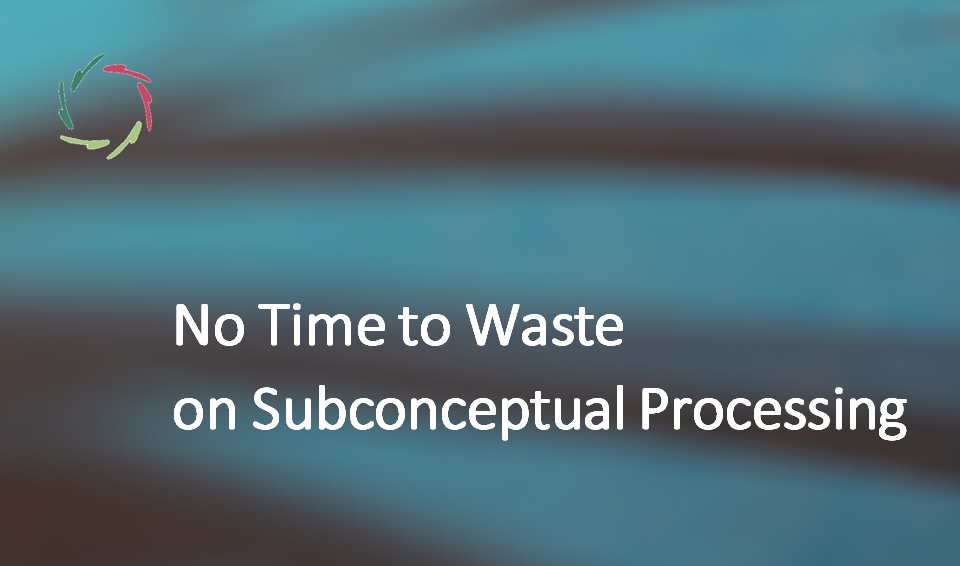No Time to Waste on Subconceptual Processing

In many issues, with ‘no time to waste,’ we end up with no time at all.
Wildfires
One can be busy extinguishing wildfires and have no time to think about climate change causing these wildfires. Of course, the wildfires need to be extinguished. But with no attention to climate change, there will be more wildfires, and one will be more busy extinguishing them, not less.
There will be ever less ‘time to waste.’
Indeed, there are many wildfires: so many things to do, to accomplish, to give one’s attention to. Hundreds, thousands daily. Any professional can feel overwhelmed.
So, one needs to make choices. That’s true; that’s life. It’s my life, also.
I guess it’s modern times.
But it’s not that simple, of course.
Please, dear reader, waste some time on this blog and think about it.
Choices have to be made based on insights. These can be fueled by data, information, knowledge, wisdom (Compassion). There is an immensely important distinction in this path. [see: “The Journey Towards Compassionate A.I.”]
“You have to look at the facts,” is a worthwhile argument, for sure. Facts are crucial. As data, they are the start of all the rest. Mind: They are no the end of everything, but only the beginning. In this sense, they are the ground level on which any decisional building gets erected.
The data are not the building itself.
With ‘facts’ (conceptually), one can also point at information, being data in a relevant context. Whether something is relevant, is somewhat subjective in any case. Sometimes very subjective.
In this sense, ‘alternative facts’ can be data as looked upon from another subjective viewpoint, forming other information. Data are data; the viewpoint is alternative. This doesn’t denigrate the importance of data nor information. On the contrary, but it does show that effort needs to be made. There is no free lunch apart from junk food.
Then there is knowledge.
Here, it really starts to become interesting and challenging. Intrinsic to knowledge is an active search for information, as well as the appropriateness of this information in specific contexts, internally (within the knowledge system itself) and externally.
On the path from data to information to knowledge, subconceptual processing (pattern-based at a level below concepts) is vital from the start. However, its importance grows as we get more into knowledge. [see: “About ‘Subconceptual’”] [see: “Subconceptual Processing in Health and Healing”]
Here, we encounter the weird situation that as evolution proceeded towards us, intelligence (knowledge) becomes more prominent. Yet, unfortunately, its conceptual side overshadows more and more the subconceptual. One crucial cause is that conceptual communication is more apt to be reproduced with little loss or distortion. It is, on the knowledge level, an example of survival of the fittest.
So, we end up with disproportionate attention to the conceptual. Good for culture; bad for nature within us.
Enters dissociation and its dire straits.
[see: “Inner Dissociation is NEVER OK!”]
There are many issues to give our attention to, cramped within 24 hours per day. Time and again, the conceptual wins. Like a cuckoo’s chicken, it pushes the subconceptual out of the nest, even as the nest has not been built for the sake of the cuckoo. He’s the trespasser after all. That’s OK if it’s done from time to time. But with exaggeration, there will be an acute shortage of nests.
Huge problem.
Note that the path doesn’t finish with knowledge. One stage further lies wisdom. In this, the subconceptual is definitely at an advantage. One can recognize this in wisdom being always related to broader patterns. It is more content than form. One metaphor can be immensely wise. One poem can fill a lifetime.
If we have no time to waste on this, I fear for us. In that case, people keep running after everything, forgetting the runner, thus reaching nothing worthwhile in the end.
All meaning itself will be lost.
Then everything goes to waste.


